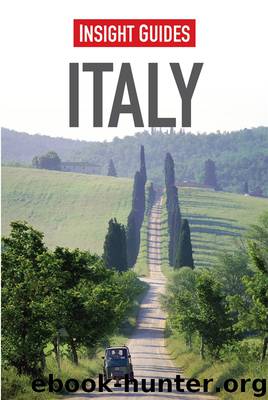Insight Guides: Italy by Insight Guides

Author:Insight Guides
Language: eng
Format: epub
Tags: Travel, Italy
Publisher: APA
Published: 2014-06-23T04:00:00+00:00
Dante sketched by A. Bronzino.
akg-images
Florentine Firsts
From street paving and glasses to capitalism and the theory of the universe – Florence’s contributions to the modern world are amazing.
Old records show that street paving began in Florence in the year 1235, and by 1339 the city had paved all its streets – the first in Europe to do so. And while Florentines had little to do with the discovery of the New World, Amerigo Vespucci provided the word “America”, and Leonardo da Vinci created the first world maps showing America. A tablet in Santa Maria Maggiore church documents another first: “Here Lies Salvino d’Amato degli Armata of Florence, the Inventor of Eyeglasses, May God Forgive His Sins, Year 1317.”
Two developments in music are among the most solidly documented Florentine firsts. The pianoforte was invented in Florence in 1711 by Cristofori, and the origins of opera are traced to the performance, in 1600, of Euridice, a new form of musical drama written by Iacopo Peri in honour of the marriage in Florence of Maria de’ Medici to Henry IV of France.
Science, architecture and etiquette
An earlier marriage was the impetus for modern table manners. When Catherine de’ Medici wed the future Henry II and moved to France, she was apparently appalled at the French court’s table manners; in contrast to Florence, no one used a fork. Before long, all of Paris society was imitating her. It is also possible that Catherine, equally appalled at French food, sent for her own chefs, and was responsible for the birth of French haute cuisine.
In the field of science, Galileo, the first astronomer to make full use of the telescope, is often called the father of modern astronomy. Not that Florentine prophets were universally lauded: Galileo was jailed by the Inquisition, while Dante was exiled. Many firsts, of course, are related to the arts. Florentine-based artists produced the first Renaissance masterpieces. Donatello’s David (1430) is regarded as the first freestanding nude statue of the Renaissance. Donatello is also credited with the first freestanding equestrian statue of the Renaissance.
The grandiose claim that Brunelleschi is the father of modern architecture is one of the least contested. He was the first Renaissance architect to evolve the rules of linear perspective, and he developed a new approach, detailing specifications in advance and separating design from construction.
Science and finance
Machiavelli, through The Prince and other works, is credited with inventing modern political science. Another literary great was Dante, whose Florentine language became the basis for modern Italian. Also in the literary field, Petrarch can be considered the father of vernacular Italian poetry and Boccaccio the father of modern Italian prose. Guicciardini is sometimes heralded as the father of modern history.
In the financial world, it is arguable that the 13th-century Florentine banks were responsible for modern capitalism, and that the city’s medieval merchants were the first of a new, and eventually dominant, social class.
But there is less doubt that those early Florentine financiers originated credit banking and double-entry bookkeeping, both of which contributed to the success of capitalism.
Download
This site does not store any files on its server. We only index and link to content provided by other sites. Please contact the content providers to delete copyright contents if any and email us, we'll remove relevant links or contents immediately.
Spell It Out by David Crystal(36110)
Underground: A Human History of the Worlds Beneath Our Feet by Will Hunt(12085)
A Year in the Merde by Stephen Clarke(5417)
Venice by Jan Morris(2568)
Claridge's: The Cookbook by Nail Martyn & Erickson Meredith(2399)
My Paris Kitchen: Recipes and Stories by Lebovitz David(2291)
A TIME OF GIFTS by Patrick Leigh Fermor(2201)
The Plantagenets by Dan Jones(2085)
Welcome to the Goddamn Ice Cube by Blair Braverman(2042)
The Finnish Way by Katja Pantzar(1993)
Top 10 Prague (EYEWITNESS TOP 10 TRAVEL GUIDES) by DK(1985)
Bang Poland: How To Make Love With Polish Girls In Poland by Roosh V(1972)
From Russia with Lunch by David Smiedt(1971)
The Isle of Mull by Terry Marsh(1945)
A TIME TO KEEP SILENCE by Patrick Leigh Fermor(1898)
Rick Steves London 2018 by Rick Steves & Gene Openshaw(1865)
A Taste of Paris by David Downie(1856)
Insight Guides Experience Tokyo by Insight Guides(1854)
Merde in Europe by Stephen Clarke(1767)
